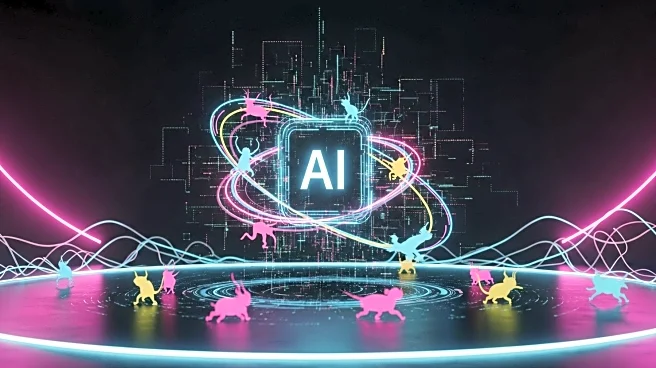What is the story about?
What's Happening?
OpenAI, in collaboration with Vertigo Films, is set to produce a feature-length film titled 'Critterz', utilizing generative AI technology. The film is an adaptation of a 2023 short film that showcased OpenAI's Dall-E image generator capabilities. With a budget of less than $30 million, the production aims to complete the film within nine months, targeting a premiere at the Cannes Film Festival next May. The original short film, directed by Chad Nelson, featured animated creatures in a forest setting, created using Dall-E. The full-length movie will expand on this concept, with James Lamont and Jon Foster, known for their work on 'Paddington in Peru', writing the script. The production will integrate sketches from human artists into AI tools for animation, leveraging OpenAI's latest research models to innovate production workflows.
Why It's Important?
The project represents a significant step in the integration of AI technology within the film industry, potentially transforming traditional animation processes. By using AI to animate films, production costs and timelines could be significantly reduced, offering new opportunities for filmmakers and studios. However, the use of generative AI in creative fields remains controversial, particularly concerning copyright issues. OpenAI and other AI companies face legal challenges over the use of copyrighted materials in training their systems. The success of 'Critterz' could influence the industry's approach to AI, impacting how films are produced and consumed, and raising questions about the role of human creativity in an increasingly automated world.
What's Next?
The production team plans to complete 'Critterz' in time for the Cannes Film Festival next May, which will serve as a major platform for showcasing the capabilities of AI-driven animation. As the film progresses, industry stakeholders will likely monitor its development closely, assessing the feasibility and desirability of AI in film production. The outcome could lead to broader adoption of AI technologies in the entertainment sector, prompting discussions on ethical and legal standards. Additionally, the reception of 'Critterz' by audiences and critics will be crucial in determining the future of AI-generated content in mainstream cinema.
Beyond the Headlines
The use of AI in film production raises deeper ethical and cultural questions about the nature of creativity and authorship. As AI tools become more sophisticated, the distinction between human and machine-generated art becomes blurred, challenging traditional notions of intellectual property and artistic expression. This shift could lead to new legal frameworks and cultural norms, as society grapples with the implications of AI-driven creativity. Furthermore, the project highlights the potential for AI to democratize filmmaking, enabling creators with limited resources to produce high-quality content, thereby diversifying the voices and stories represented in the industry.















